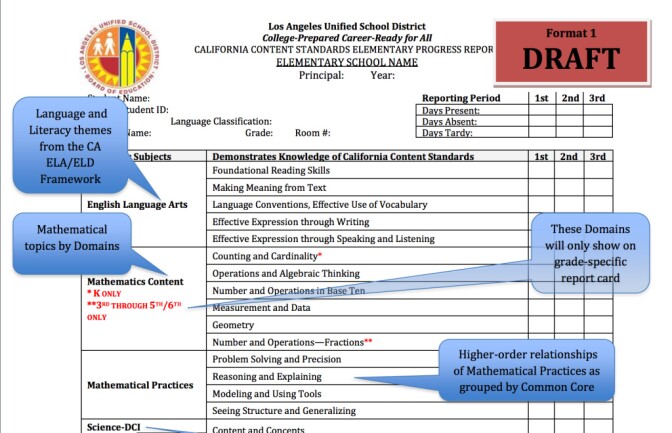This story is free to read because readers choose to support LAist. If you find value in independent local reporting, make a donation to power our newsroom today.
This archival content was originally written for and published on KPCC.org. Keep in mind that links and images may no longer work — and references may be outdated.
LA Unified plans a Common Core makeover for its elementary school report cards

The report cards sent home to parents of Los Angeles Unified elementary schoolers may soon be getting more complicated.
The report card changes are being proposed as part of a plan to better help parents track how well students are mastering the expectations spelled out in new sets of academic standards.
Right now, students get two marks for each subject: an academic grade and an effort grade.
A draft version of the new report card eliminates the grades for effort in each subject. It also condenses the current report card's section on study habits and social skills from 14 areas to five. Teachers wishing to convey more specific comments on socio-emotional aspects of a student's growth can select from a menu of roughly 800 comments to convey their specific assessments of a student.
But the new report cards significantly expand the section rating students' academic performance. For instance, instead of receiving one academic score in English Language Arts, students would receive five, each aligned with one key element of the California Content Standards.
In math, a student would receive ten marks scoring their mastery of content — such as "Measurement and Data" and "Number and Operations in Base Ten" — as well as for their problem solving skills.
"We wanted it to be a healthy balance between bare bones — too little information — and the alternative of being too much information, like an encyclopedia," said L.A. Unified director of elementary instruction Katie McGrath. "We don't want to list every standard."
California's transition to Common Core-aligned academic standards and the rollout of the new Next Generation Science Standards prompted district officials to re-examine the elementary report card. McGrath said the district hasn't substantially revised its elementary report card since around the time of the state's last academic standards update, which took place in 1997.
Common Core crafters wanted the standards to put students on track to proficiency in skills they need for college or post-secondary careers by the time they finish high school. McGrath said the new draft report card helps parents more easily track their students' progress toward proficiency by separating their content knowledge from their analytical skills.
Teachers would score students on a scale of 1 to 4, but the academic scores would be changed to align with the rubric for the Smarter Balanced standardized tests, which are aligned with the Common Core. For instance, a "3" would indicate a student "Meets Grade Level Standards."
Similarly, a "1" would no longer indicate a student is "Not Proficient," as it currently does — it would indicate a student made "Minimal Progress Toward Grade Level Standards."
The new report card likely won't be rolled out until the 2017-18 school year, McGrath said.
She said the district is accepting feedback on the new report card drafts, which she'll present to a school board committee on Tuesday. Anyone interested in commenting on the new report card can find the district's survey here.







